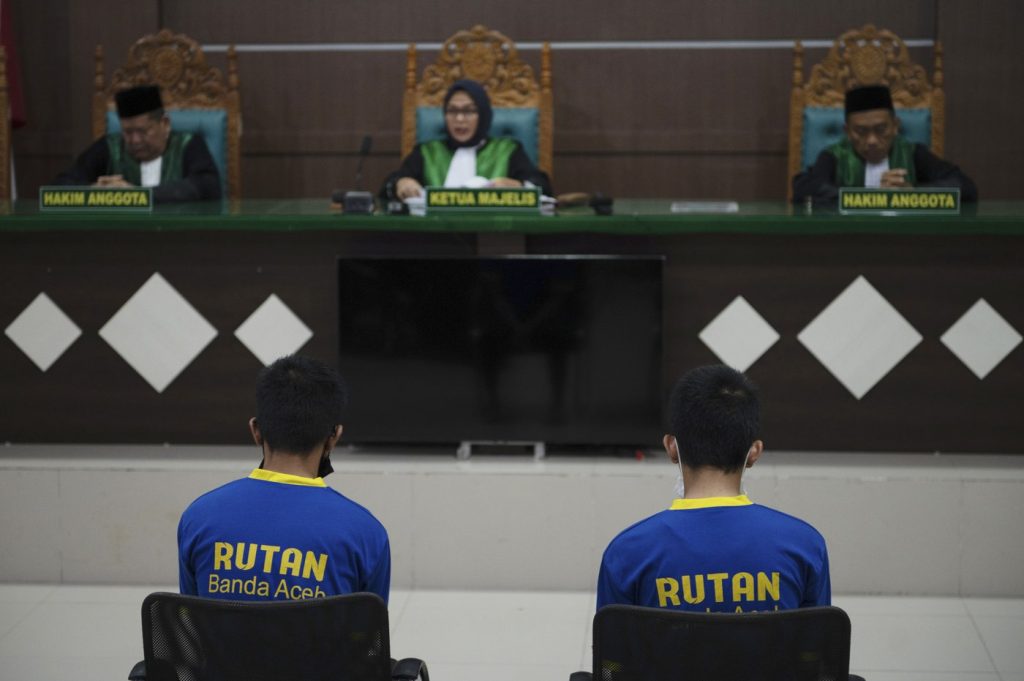BANDA ACEH, Indonesia (AP) — An Islamic Shariah court in Indonesia's conservative Aceh province has sentenced two young men to public caning due to their involvement in same-sex relations, marking a significant event in a region known for its strict interpretation of Islamic law. The men, aged 24 and 18, were apprehended on November 7 after local vigilantes, suspecting them of being gay, forcibly entered their rented room and discovered them embracing each other in a compromising position.
The presiding judge, known only as Sakwanah, stated that both defendants were "legally and convincingly" found guilty of engaging in illicit acts, including kissing and sexual conduct. Following the ruling, the court imposed a punishment of 85 lashes for the older man and 80 for the younger one. The judge explained that the panel of three judges opted against the maximum possible sentence of 100 lashes, citing the defendants' status as exemplary students, their respectful demeanor in court, their cooperation with authorities, and the absence of prior convictions.
Although prosecutors had initially requested each man receive 80 lashes, the judges believed that the older defendant was more culpable for providing a venue for the sexual encounters, justifying the additional punishment. Both the prosecution and the defense attorneys accepted the court's decision and announced they would not appeal the sentence.
Aceh is distinctive within Indonesia, being the only province authorized to enforce Islamic Shariah law more rigorously than in other regions. This legal framework was granted to Aceh's government by the secular central government of Indonesia in 2006, as part of an effort to conclude a lengthy separatist conflict. The implementation of Shariah law in Aceh has led to the establishment of a religious police force and a dedicated court system. Each year, this court issues punishments that often involve public caning, with estimates indicating that over 100 individuals have faced such penalties annually since the law's enactment.
In 2015, Aceh expanded its implementation of Islamic bylaws, which included extending the application of Shariah law to the province's small non-Muslim minority, accounting for about 1% of the population. The expanded criminal code permits severe penalties, including up to 100 lashes for moral violations, specifically targeting acts like homosexuality and extramarital sex. This recent ruling represents the third instance in which individuals have been publicly caned for homosexual activity in Aceh.
Caning in Aceh is not confined to sexual offenses; it is also administered for various moral discrepancies, such as gambling, consuming alcohol, women wearing tight clothing, and men who neglect Friday prayers. Human rights organizations have condemned these practices, arguing that they infringe upon international commitments made by Indonesia to protect the rights of minority groups.
Interestingly, while homosexuality is not explicitly criminalized by Indonesia's national laws, the central government's authority does not extend to abolishing Shariah law in Aceh. This legal landscape underscores a significant tension between local Islamic regulations and national secular principles, especially considering the previous backlash that resulted in the withdrawal of a more extreme punitive measure which included stoning for adultery.
In summary, the case highlights the ongoing challenges faced by LGBTQ+ individuals in Aceh, where religious law enforces severe consequences for behaviors deemed immoral by local authorities. The duality of Indonesia as a secular state juxtaposed with the implementation of Shariah law in Aceh continues to spark debates about human rights, legality, and religious freedoms in the region.










